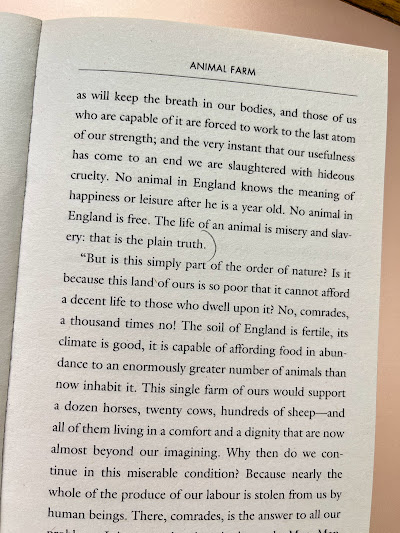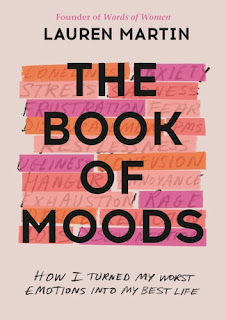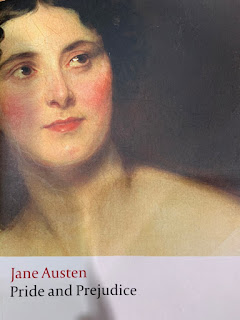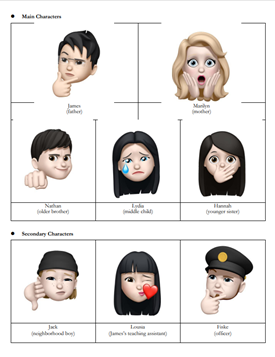One day, after Mr. Jones fell asleep, a white boar named “Major” gathered all animals of the Manor Farm. He said to the animals that it is the time for them to break free, curb their miserable condition of being controlled and exploited by human beings, and build a new world where “all animals are equal.”
I have read the book “Animal Farm” by George Orwell for the first two chapters. When I got this book, I was overwhelmed with excitement and curiosity. I always heard people talking about how famous this book is and how significant its existence is for the critique of the history and rhetoric of the Russian Revolution. With the opportunity to read books whatever we want, I thus choose this animal fable.
Since I haven’t finished the whole book, I would like to share several points I regard as attractive about this book.
1) The background of Animal Farm
The author, George Orwell, was an England born in India in 1903. The working experience of being a police in Myanmar after graduation from college made him resent Imperialism. Thus, when he returned to the UK, he hoped to pursue writing as his career. However, similar to most writers, he couldn’t make a living simply by writing. He was impoverished, and the condition of living underclass made him be inclined to support Socialism. In 1936, he joined the Trotskyists in Spain's civil war, witnessing the tyranny of communists and how they oppressed Trotskyists after they controlled the government. At the same time, the Soviet Union vigorously promoted and accused the ill of Trotskyist. The author knew the smear campaign of the Soviet Union after the experience in Spain. More importantly, it dawned on him “ how easily totalitarian propaganda can control the opinion of enlightened people in domestic countries.”
When he returned to the UK from Spain, he found many proletarians and even intellectuals easily believed in the hypocritical image that the Soviet Union built. He regarded their misunderstanding toward the Soviet Union would bring out severe consequences in developing Socialism and diplomatic policies in the UK. Consequently, he hoped to write a story to reveal the truth of the Soviet Union, and that was also the birth of this book, Animal Farm.
2) Why it is called Animal “Farm.”
After realizing the book's background, I started to wonder why the author used “ farm” to title the book and what it implied. The animal farm symbolized Russia and the Soviet Union under Communist rule.
3) Reviews for reading chapters 1 and 2
Major did a successful work to evoke each animal's aspiration to rebel against their master. He blew the pain point of each animal, directly hit their appeals. From individual profits to collective pursuits, I saw how smart and persuasive Major was. While from another point of view, these animals seemed to be so easily convinced. They deemed Major as their leader, so they believed in whatever he said. Major might somehow use his influence to control those animals to the aim he wanted to achieve. What appeared in my mind was that this plot was what would happen in our world. When we blindly followed somebody's advocacy, we might end up being used as a tool.
When Major died, the strong ambition to revolt against human beings seemed to be weakened. Probably was out of the existence of the chief, the true value of their plan started to have different explanations by different animals, and also, the illustration of belief was not as central as when Major was still alive.
In the meantime, the behaviors of some animals were also ironic. They were originally planned to launch a great revolution, with a beautiful blue map, and an ambitious goal. However, some animals started to doubt the necessity of the rebellion, focusing on the short-term profit they can enjoy despite the fact under the ruling of human beings. Take the mare Mollie, for example, she only cared about whether she could still wear ribbons in her mane, or whether there still be sugar after the rebellion. I think these behaviors reflect two things:
1) Their faith in rebellion is weak.
After the head disappeared, their belief also faded away. No matter how vigorous and devoted they used to be, that kind of passion was built on the shaky foundation with ignorant awareness of their own behavior.
2) The disregard for mutual prosperity.
The plot might imply that no matter how crucial and precarious the situation is, there will always be people who rather choose to sit back and give up resistance. Major had told those animals they were exploited by human beings, and they would even be killed eventually. While after Major died, it seems that some animals show no cares for their authentic and long-term self-interest. They are short-sighted and lacked the willingness to build a prospective future for their descendants.












